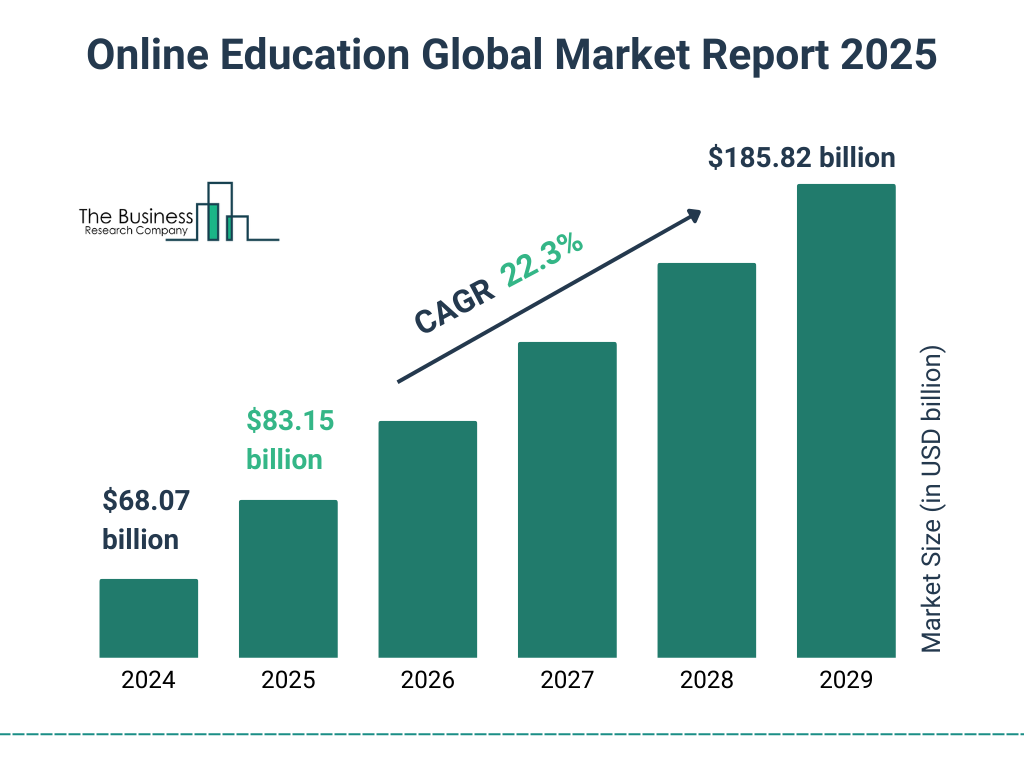Now Reading: Online Education Growth in 2025 Is Changing Schools Forever
-
01
Online Education Growth in 2025 Is Changing Schools Forever
Online Education Growth in 2025 Is Changing Schools Forever

Table of Contents
In recent years, online education growth has dramatically reshaped the global education landscape. Once considered a secondary or supplementary option, online learning has rapidly become a mainstream choice for millions of students, educators, and professionals across the world. From school children attending virtual classrooms to executives upgrading their skills through e-learning platforms, digital education has moved from the margins to the center of the academic world.
Driven by technological innovation, increased internet access, and changing social needs, this growth is not just a trend—it is a long-term transformation. The future of education appears increasingly digital, personalized, and accessible.
The Numbers Behind the Boom

According to a report by Research and Markets, the global online education market was valued at over USD 220 billion in 2022, and it is expected to reach USD 585 billion by 2030, growing at a compound annual growth rate (CAGR) of over 12%. This massive expansion is being fueled by several key factors, including increasing smartphone usage, affordability of data, rising demand for flexible learning options, and corporate investment in employee upskilling.
Countries like India, the United States, China, and Brazil have seen exponential growth in online enrollments. Massive Open Online Courses (MOOCs) providers such as Coursera, edX, and Udemy report tens of millions of users, with course registrations soaring in areas like technology, business, data science, and languages.
COVID-19 as the Catalyst
While the seeds of online education were planted years ago, the COVID-19 pandemic acted as a powerful catalyst. Lockdowns forced educational institutions around the world to shut down physical classrooms, pushing both educators and students into the digital realm overnight. What was once seen as an optional or luxury method became a necessity.
Even after the world began to recover, many educational systems realized the benefits of hybrid or fully online learning. From video lectures and discussion forums to AI-powered assessments and digital certifications, online platforms provided scalability and adaptability that traditional systems struggled to match.
Advantages Driving the Demand
One of the biggest appeals of online education is flexibility. Students can learn at their own pace, access content anytime and anywhere, and customize their schedules according to their personal and professional lives. This is particularly beneficial for working professionals, parents, and students in remote areas who may not have easy access to quality educational institutions.
Cost is another crucial factor. Many online courses and degrees are significantly cheaper than traditional options. Additionally, learners save money on commuting, lodging, and other associated expenses.
Online learning also offers personalization. With the help of Artificial Intelligence and data analytics, platforms can tailor content to suit individual learning styles and pace. This kind of adaptive learning has shown to increase engagement and improve outcomes.
Challenges and Concerns
Despite its growth, online education is not without its challenges. One major issue is the digital divide many students, especially in developing regions, lack access to stable internet, computers, or smartphones. This has created a gap in educational equality, with millions still left behind.
There are also concerns regarding student engagement and retention. Without face-to-face interaction, many learners struggle with motivation and discipline. Some critics argue that online platforms may not always provide the same level of interaction, mentorship, and social learning that traditional classrooms offer.
Additionally, quality assurance remains a concern. With the surge of new providers and courses, there’s a growing need to ensure that content meets academic and industry standards. Accreditation, plagiarism, and fake certifications are other emerging issues that authorities need to regulate.
Innovations Shaping the Future
Despite the hurdles, the future of online education looks promising and full of innovation. AI and Machine Learning are playing a major role in creating smarter learning platforms. They can analyze student behavior, recommend resources, and even automate assessments.
Virtual Reality (VR) and Augmented Reality (AR) are being used to offer immersive learning experiences, especially in fields like medicine, engineering, and design. Simulated labs and 3D environments provide a hands-on experience without requiring physical presence.
Blockchain technology is also being explored for secure certification and transcript verification, helping to combat fraud and enhance trust in online credentials.
Furthermore, gamification, live streaming, peer-to-peer learning, and real-time feedback mechanisms are making online learning more interactive and effective than ever before.
Corporate Learning and Online Degrees

The corporate sector is one of the biggest beneficiaries and contributors to online education growth. Companies are increasingly investing in Learning Management Systems (LMS) and partnerships with platforms to upskill their workforce. In-demand skills like coding, project management, digital marketing, and leadership are being taught through customizable courses tailored to organizational goals.
Even traditional universities are adapting. Top institutions like Harvard, Stanford, and Oxford are offering online degrees and executive education, reaching global audiences without the need for relocation. In some cases, these programs are even being preferred for their cost-effectiveness and flexible formats.
Final Thoughts: A Permanent Shift
The growth of online education is not just a response to global disruption it is a sign of an evolving society. Learners are demanding flexibility, affordability, and relevance. Employers are seeking continuous development. Educators are discovering new ways to engage and inspire.
While there are still hurdles to overcome, the rise of online education represents one of the most significant shifts in modern history. It’s not replacing traditional education entirely, but complementing and expanding it in ways never imagined before.
As we move further into the digital age, education will likely become more hybrid, inclusive, and tech-driven, offering lifelong learning opportunities to people across the globe. The screen is no longer a barrier it’s a bridge to the future of knowledge.
Read More:- Deyaar’s Latest Announcement Shakes Up the UAE Property Market






















